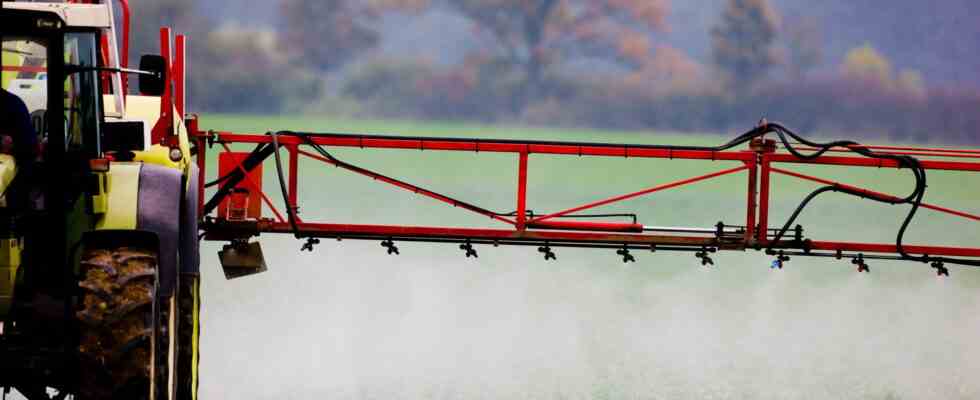Status: 12/30/2022 1:43 p.m
The World Summit on Nature in Montreal has decided to halve the use of pesticides. At the same time, the approval for glyphosate in the EU will be extended. What does this mean for the environment? Will there soon be less agrochemicals in Germany?
It is the best-known and at the same time most controversial active ingredient in pesticides: the herbicide glyphosate. The European Commission has extended the approval of glyphosate until December 15, 2023 to give the food safety authority EFSA more time to review new studies and possible risks.
Around 4000 tons of glyphosate are sprayed in Germany every year. This corresponds to about ten percent of the total pesticide active ingredients sold in Germany. 25 years ago, significantly less glyphosate was used in Germany than today, says Jörn Wogram, head of the pesticides department at the Federal Environment Agency. The possible uses of the weed killer were restricted in recent years, while the Merkel government was still in power. Nevertheless, Wogram states: “We currently do not see a clear trend for a decline.”
Glyphosate breaks the food chain
Glyphosate is a broad spectrum herbicide. In other words, it kills all plants it comes into contact with. “This means that glyphosate also destroys plants that do not need to be fought at all,” says the scientist. The field pansy, for example, is a relatively small plant that does not compete with cereal plants.
“From an ecological point of view, such plants are incredibly important for insects.” The little fritillary butterfly, for example, is dependent on this. The caterpillars eat the leaves of field pansies. “If all of this vegetation is removed, then the insects and, as a result, farmland birds that live on the insects will also be severely affected,” explains Wogram. “This is the impact we are seeing from the use of glyphosate and other broad spectrum herbicides in the environment, in the EU and in Germany, for decades.”
In Germany, this means that partridge stocks have “collapsed very, very badly and locally the partridge has died out”. But the skylark population has also declined significantly.
The aim is to use fewer pesticides overall
The EU and the World Nature Summit have formulated a goal: the use of pesticides should be halved by 2030. Approved pesticides have a strong impact on the environment, according to the expert from the Federal Environment Agency. “That actually applies to almost all products.”
Most of the drugs have very strong effects on animals or plants. Therefore, from the point of view of the Federal Environment Agency, it is necessary to talk about measures against these negative effects and also about how the use of pesticides can be reduced. It is therefore very important, said Wogram, to significantly increase the proportion of areas cultivated without pesticides.
In Germany, a lot is sprayed
“Unfortunately, we don’t see any clear downward trend in the use of pesticides in Germany,” says Jörn Wogram. The amount of pesticides used in Germany is still very high, even in comparison to other EU member states such as Denmark.
Measures have been taken there to reduce the use of pesticides. A pesticide tax was introduced. The money raised in this way is used for agricultural advice. In Denmark, for example, it was actually possible to reduce the use of pesticides.
Compared to other EU countries, a particularly large number of herbicides such as glyphosate are used in Germany.
Image: picture alliance/dpa/dpa-Zentralbild
Number of hoverflies dropped by 90 percent
Researchers have recorded a dramatic decline in the insect fauna in Germany and throughout the EU. “In Germany there are only ten percent of the hoverflies that were flying around here in the early 1980s,” explains Jörn Wogram. However, the larvae of the hoverflies are very important helpers in agriculture. They eat aphids.
“This example shows that the effects of using pesticides also have an impact on agriculture,” says Wogram. In conventional agriculture, therefore, more areas would have to be created without pesticides, according to the head of the Pesticides department at the Federal Environment Agency.
Fallow land may be used again from 2023
From 2023, new funding rules of the Common Agricultural Policy will apply in the EU. The member states have agreed to temporarily take four percent of the arable land out of production. Such fallow land is intended to protect biodiversity. Originally, an area share of ten percent was discussed. Environmental groups criticized that the proportion of four percent was too low.
With the outbreak of war in Ukraine and the resulting wheat crisis, farmers’ associations and conservative politicians called for the fallow land to be cultivated again in order to grow grain. The Federal Ministry of Agriculture under Cem Özdemir (Bündnis 90/Die Grünen) did not give in to the pressure and referred to the importance of these areas for biological diversity.
But there is one concession: in 2023, neither tillage nor the use of fertilizers or pesticides will be permitted on the so-called non-productive areas, but they may be used for fodder production.
By 2030: Organic farming on 30 percent of the area
According to a spokesman for the Federal Ministry of Food and Agriculture (BMEL), food security can only be achieved with climate protection and the preservation of biodiversity. “That’s why the federal government is pursuing an agricultural policy that takes climate protection and biodiversity into account as a prerequisite for sustainable, crisis-proof and thus future-proof agriculture.”
The aim is to significantly reduce the use of pesticides. The BMEL intends to present a program on this in 2023. However, the federal government is also focusing on more organic farming: by 2030, 30 percent of the agriculturally used area in Germany is to be farmed organically. Currently, the proportion of organically farmed areas is only eleven percent. New funding incentives are intended to support the willingness to switch to organic farming.

